Falklands War veterans return to face their demons
"When you're 19, you're Superman - you can walk through walls, you are indestructible, you are the master of the universe, you've got everything in front of you."
Mick Hermanis was one of 26,000 men and women who were sent from the UK to defend the Falkland Islands in 1982.
The British defeated the Argentines in just three and a half weeks and returned home victorious.
But the trauma of fighting a war continues to affect them decades later.
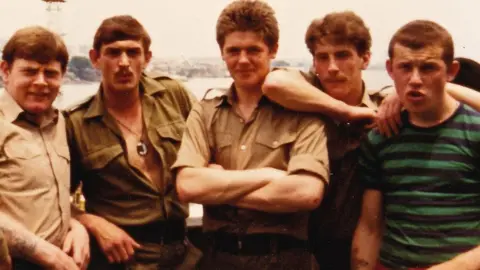
BBC Panorama followed a group of former Welsh Guards, who have remained friends, as they flew 8,000 miles back to the Falklands to confront their demons for the first time in 35 years.
Now in their 50s, as teenagers these men knew little of what they were getting themselves into. Yet their lives have been shaped by their Falklands experience.
'It broke my heart'
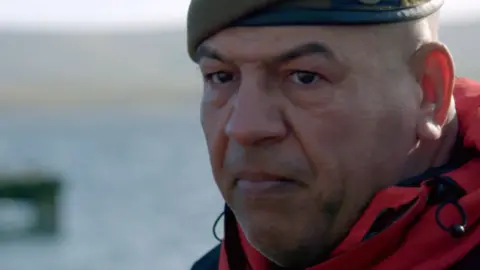
Mick Hermanis survived the attack on the Sir Galahad landing ship - where the Welsh Guards suffered their heaviest losses, and where many of his friends died.
This, combined with the fact that he never fired a bullet during the war, has left him with a strong feeling of survivor guilt.
On his return home from war, he says: "All the neighbours in the street were out and [I had] a bloody big hero's welcome".
He says it "broke my heart" to be given such a welcome when some of his mates would never return.
Mick was extremely nervous and apprehensive about returning to the Falklands. He had planned to go back in 2008 but bottled it at the last minute.
He says: "Not a single day that goes by when you don't think about it... think about the boys… friends that we lost... some bloody fantastic boys."
Mick has had low moments, suffering from Post Traumatic Stress Disorder (PTSD) and anger issues.
'I just blanked it'
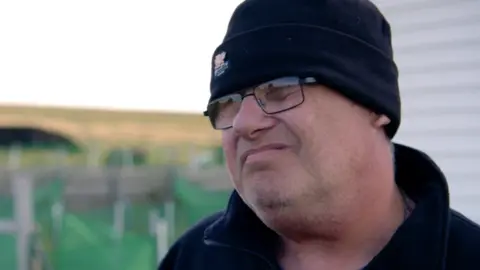
Nigel O'Keefe was 18 when he served in the infantry in the Falklands. At first, he says he "blanked" his experiences, "but as I grew older it started eating away at me".
Nigel's defining memory was when his platoon found itself in one of the many minefields laid by the Argentines.
He told Panorama: "We were advancing, it was pitch black, there was tracer flying everywhere and a guy from the SAS came running out the single fire line and told everyone to stop - he said we're in a minefield.
"And as soon as he's told us that I could hear this screaming, high-pitched, really, really high-pitched screaming and I said: 'What the hell are women and kids doing out here?', like.
"I found out then it was two Royal Marines who'd stepped on anti-personnel mines.
"I've never heard a grown man scream so high-pitched like that."
Having never really addressed his PTSD and depression, he still suffers from terrible nightmares, and he masks his problems with alcohol.
It has caused him to lose both his job and his family; he is divorced and his four children rarely come to visit.
Nigel saw his trip back to the Falklands as his last chance to get his life back on track - since the trip he has given up alcohol and is working on repairing his relationship with his children.
'He had no face at all'
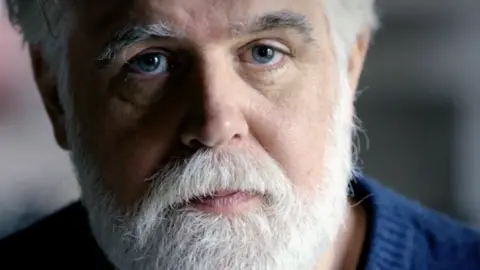
Will Kevans rarely talks about the Falklands, unless he's had a few drinks. He was 19 when he went to war and his memories still haunt him.
"I remember walking up and seeing something in the road and it was the body of a dead Argentine soldier and, for reasons I still don't understand today, I put my hand down and wanted to look at the guy's face.
"I picked his head up and it had no face. No face at all and it was just a cross section of his skull.
"All of his teeth were all over the place, bone fragments and blood all over the place and it was something that has haunted me for a very long time.
"Some of the lads were looking through his possessions and they found photographs of his family and it just made me think immediately that this man could have been me."
After the war Will stayed in the Army for a couple of years as a parachutist, but then went on to become a singer-songwriter and successful cartoonist. He has drawn Dennis the Menace and worked for the Telegraph newspaper.
He says: "I think a lot of the pain that I suffered from the Falklands, I've kind of alleviated it by being able to do art connected with it… so I'm lucky I have that safety valve".
'Underneath you're screaming'
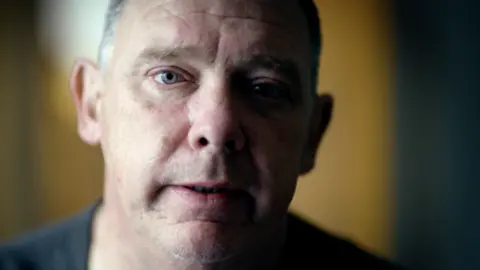
Paul Bromwell has suffered from bouts of aggression and severe insomnia. He says the Falklands "marked me for the rest of my life".
He spent the war in the recce platoon, meaning he was always the first one into battle. He saw a lot of action and was involved in the fighting at Goose Green and Mount Harriet.
He told Panorama: "I'd been through hell, and when I went home it just seemed nothing had changed - everybody was carrying on with their life and yet inside I was hurting a lot, so much, I'd lost too many good friends".
Almost immediately he began to suffer from PTSD and a severe feeling of not belonging in society.
He drank his way through it and completed a treatment programme, but he remains very affected by the conflict.
"It's a devil really, because you can't see the injury, everyone thinks you're all right but underneath you're screaming," he says.
Today, he runs veteran self-help groups and takes care of mistreated horses which often exhibit similar signs of anxiety and stress.
Watch BBC Panorama - Back to the Falklands: Brothers In Arms on Monday 5 June at 20:30 BST on BBC One and afterwards on BBC iPlayer.
